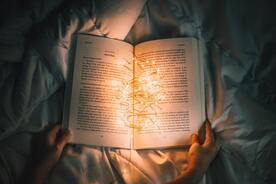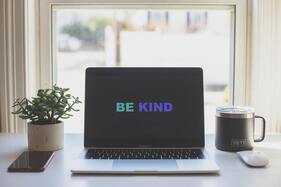 We are introduced to books at a very young age. They are read to us as forms of entertainment and bedtime stories. We learn to read using them. We learn how to tell stories. If you’re a writer, books most likely had more of an impact on you than most. I think it is this that should make us aware of the responsibility we have to readers to make stories that make them feel safe, seen, and enthralled. In order to do that, we have to explore a fundamental question: Why do we read anyway? More specifically, why do we read fiction? If we are not reading for the purpose of research, why do we still pick up the books? Why do we feel compelled to reach for the book about dragons, the books about everyday life, the love stories? Why do we choose books about people who offer different perspectives? Why do we read? That answer may vary from person to person. Some may read books that remind them of their own lives, they want to feel seen. Some want the exact opposite--they want a book about an entirely different world with characters nothing like them. They want an escape. Some read to learn about others’ experiences. Some want to be comforted by a story, while others want to be frightened. Some prefer happily ever afters, while others long for a tragic or bitter-sweet ending. Our tastes and what we want evolve over time. We become different readers, and therefore different writers. But does what we read at younger ages influence what we read as we grow up? After asking about ten people, I found various results. There were a lot of the same favorite books from childhood. This may be due to the fact that most of the people I asked were in the same age range. Popular favorites during childhood include Junie B. Jones, The Magic Treehouse, The Gallagher Girls, Percy Jackson, Harry Potter, The American Girl Doll books, and Diary of a Wimpy Kid. I think this selection of books makes perfect sense. Kids love using their imagination, so books series such as Harry Potter, Percy Jackson, and The Magic Treehouse give them that outlet. On the other hand, Junie B. Jones and Diary of a Wimpy Kid offers a relatable story that helps kids feel seen--and they’re humorous. Popular books that were listed as favorites now include One of Us Is Lying, Darius the Great is Not Okay, Simon vs The Homosapien Agenda, The Perks of Being a Wallflower, and Welcome to Night Vale. Like the books from childhood, each of these books aim to either be relatable and show voices that may have not previously been given a platform, or to create an entirely new world where we can escape to. These seem to be the primary reasons for why we read. More than anything, we remember books that make us feel things. Sometimes specific plot points and quotes get blurry overtime, but what lasts is the memory of how that book-- its story and its characters--made us feel. So what does this mean for us as writers? I think that if you do write creatively and you aim to write novels, it's important to create art that is authentic to you, but you should also consider the audience. Not only from a marketing perspective, but think about how they might benefit from your story. Are you going to offer them solace, escape, education, or comfort? It’s important to consider what we want out of a book when we read it, and apply that to our own writing. Of course write what fulfills you as a storyteller, but remember that if you are meaning to share this story with the world, it will impact others as well. This is the ethical responsibility of writers. Considering how your words are going to affect readers, especially when writing for children or young adults, is vital to the process. The correlation between people’s favorite books as children vs now seems to be that in both cases, at these very different stages in their life, they are seeking escapism and/or visibility. It is our job as writers to give that to them. One other thing that fiction does for readers is offer a different perspective. We only have this one life, and it's sometimes hard to grasp the many different types of lives other people are living. By reading about the lives of people different from us, fiction encourages empathy and understanding. This is why it is so important to uplift voices of marginalized groups in fiction, as well as other genres. Not only does it help marginalized audiences feel seen, but it offers a new perspective for those who may have never considered how other people live. Something interesting that I noticed while comparing responses to the most popular favorite books as children vs now is that as children, it seems most of the books read were very white, heteronormative, and male dominant in terms of characters and plot. However, looking at the more popular books as the respondents grew up, there is a lot more diversity in terms of race, sexuality, ability, and gender. This may be due to the fact that exploring identity is a convention of the Young Adult genre. But it is important to explore these themes in children’s books as well. From a young age, children should be able to see themselves and people different from them in these stories. While I think this is improving, the work is nowhere near done. This all ties back to that question. Why do we read? To feel seen, to escape, and to learn. To understand and to be understood. That is the goal of reading, and therefore, the goal of writing. Our perspectives as readers have to feed into what we write. Passing on what you get out of reading, whatever that may be, into your own writing will give others the opportunity to experience the reason you love reading. Isn’t that the point of storytelling?
0 Comments
Stereotypes abound in literature. They become part of formulas, stock characters or situations that are used across genres. But stereotypes are just generally accepted assumptions about groups of people, and many times, not only are they untrue, they are hurtful and dehumanizing. Everyone deserves representation in literature. I’ve gathered two members of the Writing Arts student body and of the LGBTQ community, Scott MacLean and Georgia Iris Salvaryn, to discuss LGBTQ stereotypes in literature and how to avoid them in writing. Writer’s Insider: What harmful stereotypes have you seen in literature and other media? Scott MacLean: So one of the most prominent stereotypes that I see usually involves gay men being obsessed with straight men or straight-acting men. It reinforces this predatory idea that all gay men want to seduce masculine straight guys. Another thing I've noticed is sometimes it seems like they include a gay character just to check off a box, and then the character is just a shallow one-dimensional character with no backstory or progression (e.g., the gay best friend). The worst stereotype is the fixation on sex, as if that is all gay men care about and they just can't control their libido. So many of the movies I've seen that are labeled "LGBTQ" are about drugs, partying and sexual encounters. I think sometimes people are just trying too hard when they write gay characters or not nearly hard enough. I'm also so tired of seeing gay characters die or have unhappy endings. Why can't they get married in the end? Why can't they ride off into the sunset? I understand it's important to show the struggles that people in the LGBTQ community face, but I don't think that every story has to end in tragedy. Georgia Iris Salvaryn: I have only recently started reading and watching LGBTQ literature and media, but I have heard that many times, the author/creator forms their LGBTQ characters based on mainly stereotypes. I'm personally not sure if that is just something that is "inescapable" (in other words, if the person who wrote the book or created the media doesn't identify as that sexuality, how can they otherwise write the character if not based on some stereotypes?) or if it's their choice to create generic characters and/or "drama" within the story. “Sometimes it seems like authors include a gay character just to check off a box.” |
Archives
May 2024
Categories |





 RSS Feed
RSS Feed